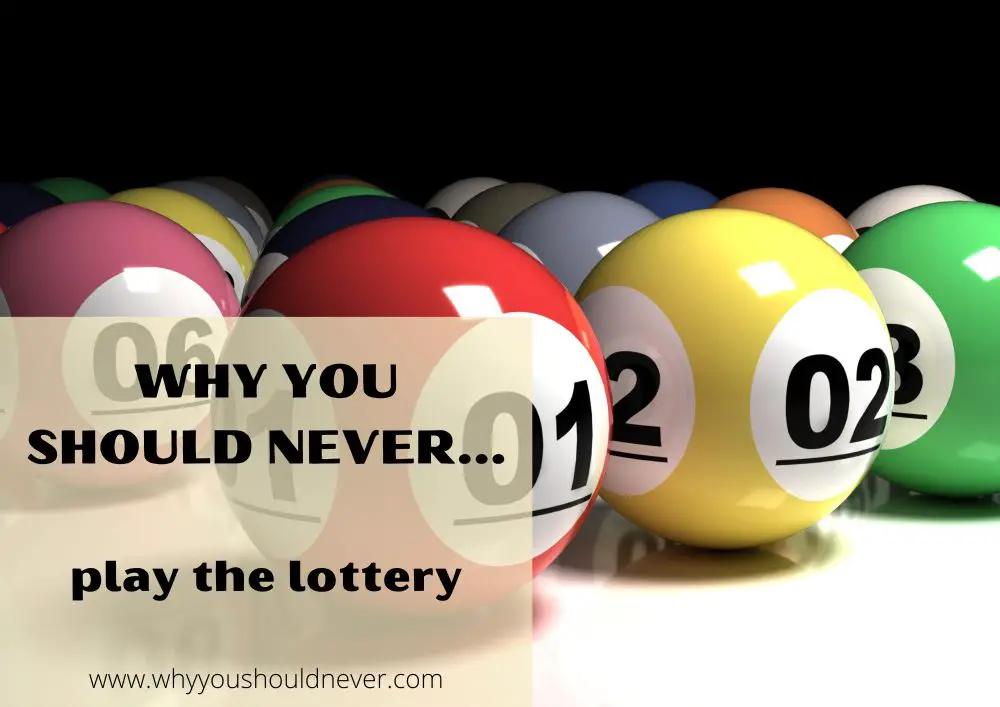![]()
Why You Should Never Play The Lottery
It’s everyone’s dream to win it big on the lottery. Who wouldn’t want to become instantaneously wealthy beyond their wildest dreams? With lotteries sometimes exceeding jackpots of a billion dollars, it’s no wonder why so many people continue to play.
Unfortunately, the odds of winning the lottery are so high that it’s not worth gambling your money on. In this article, we’ll explore some of the reasons why you shouldn’t play the lottery with your hard-earned cash.
10 reasons why you shouldn’t play the lottery
1. The odds of winning are astronomically high
Let’s say you play the Powerball lottery. The odds of winning the jackpot are 1 in 292 million. That means you’re much more likely to be hit by lightning (1 in 300,000) or die from falling out of bed (1 in 2 million) than you are to win the Powerball jackpot.
2. Interest earned on lottery winnings is taxable
While it may be nice to think about what you would do with your lottery winnings, it’s important to remember that the government will take a sizable chunk from the interest earned.
If you’re not careful, you could get carried away spending the money, and then end up owing the government taxes that you didn’t realize you had to pay.
3. Gambling can be addictive
For some people, gambling can become an addiction. And although playing the lottery isn’t as risky as other forms of gambling, such as casino games or sports betting, it can still be addictive for some people.
It might also lead to more serious gambling, like the ones we just mentioned, as you try to chase that rush.
4. Everyone will expect you to give them money
If you win the lottery, suddenly everyone will be your best friend. And they’ll all want a piece of your newfound fortune.
You may end up giving money to people you don’t even really know, and before you know it, you could be broke again.
5. You could become a target for criminals
If you win the lottery, your name and photo will be published in the news. And that could make you a target for criminals.
Criminals might try to kidnap you or your family or try to rob you.
6. Anyone who inherits the money when you die will pay high taxes
If you were to win the lottery, even though you yourself wouldn’t be taxed, the estate taxes when you die would be high. In the United States, your beneficiaries would have to pay up to 40% in estate taxes, which would eat up a large chunk of the money you left behind.
7. Lottery winners often end up broke within a few years
It’s called the “lottery curse” for a reason. Many people who suddenly come into a large sum of money end up blowing it all, ending up worse off than they were before they won.
Without proper financial planning and advice, it’s all too easy to make poor decisions with your newfound wealth and end up right back where you started—or worse.
8. State lotteries are often used as political slush funds
In many states, lottery revenue is supposed to go towards education but often winds up being used for other things instead—things like pet projects or bloated bureaucracy.
Just by playing the lottery, you could be unwittingly funding things you don’t even agree with.
9. You could put that money towards something more productive
There are so many worthy causes out there that could use your financial support. Why not give to one of them instead of giving your money to the government through state-sponsored gambling?
You could save up the money and invest in a solid stock portfolio, put it towards your retirement, pay off debt, or start your own business. All of these things would be more productive uses of your money than playing the lottery.
10. It can lead to depression when you don’t win
Let’s face it, you’re not going to win, no matter how badly you want to. And the more you play, the more likely it is that you’ll end up feeling depressed when you don’t win.
Depression is a serious mental illness, and it’s not worth risking your mental health just for a slim chance to win some money.
Conclusion
Just say no to playing the lottery! It’s a waste of time and money with nothing good coming out of it—not for you and certainly not for society as a whole. We hope this article has helped you see the light and that you’ll make wiser choices with your hard-earned cash going forward.
